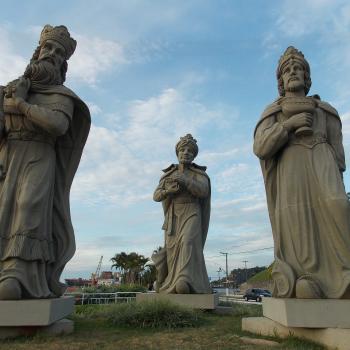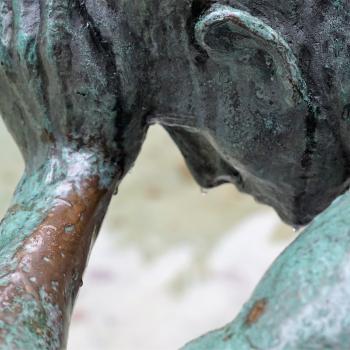 Earlier we took a quick look at a scientific experiment conducted by Pascal in 1646, and we considered the ways that that experiment led him to two general “laws” of knowledge. If we want to know what is truly true, we will not rely only on what we’ve been told, and we will not rely on what seems most logical. We will use our reason, and we will discover the truth for ourselves.
Earlier we took a quick look at a scientific experiment conducted by Pascal in 1646, and we considered the ways that that experiment led him to two general “laws” of knowledge. If we want to know what is truly true, we will not rely only on what we’ve been told, and we will not rely on what seems most logical. We will use our reason, and we will discover the truth for ourselves.
In our world, faith is treated as the antithesis of knowledge. Knowledge is factual; faith is subjective opinion. Pascal, however, believed faith to be a particular kind of knowledge, and his approach to the spiritual life, therefore, could embrace both of these two “laws” that also applied to scientific work. Thus he developed a distinctive approach to faith and reason that we call Pascalian. To become a neo-Pascalian will require us to work with both of these.
First of all, Pascal embraced reason, even in the work of faith. Faith is not a blind leap into the darkness of the ridiculous. It is not a willingness to be incredulous, naïve, or simple-minded in the hope that, if I jump, Someone will catch me. It is not a resistance to careful thought in the mistaken belief that thinking about spiritual truths—wrestling with them, challenging them, poking at them, questioning them—displays some inner arrogance that disqualifies us from faith. It is not the image we get in Indiana Jones and the Last Crusade when Jones has to take a step onto nothingness in the attempt to cross an abyss.
The term for this kind of approach is fideism: an antagonism to the use of reason in understanding or communicating about religious beliefs, which cannot be subjected to puny human understanding. Fideism argues that, despite all evidence to the contrary, you must just step out into the void. But Pascal was no fideist.
The opposite of this is called evidentialism, which is equally radical; it argues that if you can’t prove it, if there isn’t irrefutable evidence of something, you shouldn’t believe it. And, of course, “proof” and “evidence” are usually defined empirically, materialistically. Pascal wasn’t that either.
Evangelicalism has a weird relationship with reason. On one hand, an awful lot of the evangelical ethos is cerebral. It’s about correct doctrine, propositional truth, “rightly dividing the word of God,” having good answers, standing bold in the face of liberal sentiment or superficial emotions. This exposes our Reformational roots. Our mid-16th-century DNA is quite fixated on scriptural interpretation, original Greek and Hebrew texts, and the refutation of squishy arguments and human traditions. All this has, unfortunately, left faith, for many of us, in our heads. All kinds of right answers and very little genuine intimacy with God.
And yet, on the other hand, we’re oddly anti-intellectual at the same time. We’ve all heard the snarky response to the title of Mark Noll’s powerful The Scandal of the Evangelical Mind… that there isn’t one. We’ve been reluctant to embrace the work of science; we have spent years avoiding cultural engagement in the arts; we largely abandoned the secular academic world. We’ve hunkered down in our virtual gated communities of Christian magazines, Christian colleges, Christian publishing, etc. This exposes our Fundamentalist roots. Our early 20th-century DNA is all about building our private ark to float in all cozy while the rest of the world drowns.
Pascal avoids both of these traps by letting reason serve its proper purpose, but not letting it go beyond its own limits.
“If we offend the principles of reason our religion will be absurd and ridiculous” (f. 173). And haven’t we seen too many examples of this? Several of them were on national display during the last election season.
“Reason’s last step is the recognition that there are an infinite number of things which are beyond it. It is merely feeble if it does not go as far as to realize that” (f. 188). The power of reason itself demands that we recognize its limitations; “the paradox is that only reason can persuade reason of its own inadequacy” (Krailsheimer). Reason alone is not going to get you everything you want; it is not going to tell you everything you want to know; it is not going to resolve all your questions. But without reason as a starting place and a trajectory, we are likely to end up in a Willy Wonka world.
This tension between a reasonable faith and a faith without “proof” is the place we want to be: the neo-Pascalian sweet spot.
The second principle is also important when we look at Pascal’s life of faith. This is the principle of experience (in science: experimentation, discovery, encounter). Here we come to a central mystery of Pascal’s life, one that defies easy description: the Memorial.
“The year of grace 1654 . . . From about half past ten in the evening until half past midnight . . . Fire . . .”
___________________
Note to Reader: This series on Becoming Neo-Pascalian considers some of the ways Blaise Pascal (1623-1662) speaks into the 21st century. It draws from my own research, published in Beyond the Contingent (2011), and citations are from the book, unless otherwise noted. The beginning of the series is here: Introduction.












